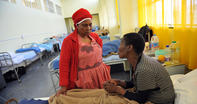
The ‘Aids House’
In 1964 I had a baby named Olive. In 1966 another one came - Phyllis, the one who is now in her fifteenth year with HIV/Aids. Kenneth was born in 1969 and Prudence, who died of Aids, like Olive, was born two years later. My granddaughter, Zizipho, was born with HIV because her mother, Prudence, had HIV. Behind my back the neighbors had been calling my house an 'Aids house'. My granddaughter Juliette heard them talking and told me about it.
These neighbor said to my own grandchildren, 'We don't want you to play with our children. In your house there is too much Aids, and you will infect our children.’ That was a time when people knew very little about Aids and everyone was very scared of it. Now, things are different. We all know people who have died, mostly in our own families.
These days, if a member of my family is sick, even with Aids, the ladies from my church are coming to see me, bringing me soup and meals and talking to me about it. There is not the same loneliness as before. Now we have support. For 15 years, my daughter Phyllis has been fighting this Aids.
For a long time she had extremely drug-resistant tuberculosis and she was in hospital for many months. Now the doctors say she is cured of TB, but she has cancer of the stomach and the liver. Only a few months ago she told me she would 'not be long in this world'. It plunged me into despair again.
By Jo-Anne Smetherham